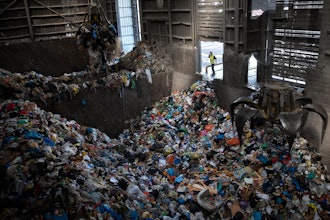IOWA CITY, Iowa (AP) — A Grain Processing Corp. plant in Muscatine, Iowa that makes corn-based products emits so much pollution that it has damaged homes, cars and property across the city, according to a lawsuit filed Monday.
The lawsuit, filed by 11 residents, alleges the Grain Processing plant spews harmful chemicals and particulate matter for miles as the wind blows, routinely blanketing homes and cars with soot and causing metals in everything from swing sets to siding and air conditioning systems to corrode.
The lawsuit is seeking class-action status on behalf of roughly 17,000 residents who live within three miles of the corn milling plant, or most of the city of Muscatine. The plant makes products such as alcohol, corn starch and corn oil for a variety of applications and is one of the Mississippi River city's largest employers.
"Muscatine residents not only have to frequently clean their personal and real property to remove this particulate matter, but also breathe these pollutants into their lungs on a daily basis," says the lawsuit, filed in state court.
After waiting for years as the company failed to stop air quality violations, attorney Tony Buzbee said residents were fed up and filed the lawsuit to try to force more dramatic changes. Buzbee, a prominent environmental lawyer from Texas, said he expected to file a raft of lawsuits on behalf of dozens of individual plaintiffs in the coming weeks.
"There is real, verified damage being done to people's real and personal property. Ask anyone who lives in the area who every morning has to clean their car because it's covered in soot again," he said. "Go down there like I did last night and just look at the smoke billowing out of the facility and where it lands. It barely goes above the stacks, moves to the right, crosses the road and starts to slowly permeate into the neighborhood. It's pretty dramatic."
Buzbee said he filed the lawsuit after recent testing at homes and public parks revealed dangerously high levels of acetaldehyde and sulfuric acid, among other substances. The lawsuit alleges the plant is a nuisance that causes damage and prevents citizens from enjoying their property, and that the company is negligent in failing to stop pollution.
It is the latest effort aimed at forcing GPC to install tighter pollution controls after a history of problems.
Iowa Attorney General Tom Miller in December filed a lawsuit alleging GPC emitted excess particulate matter and sulfur dioxide, failed to maintain and repair equipment to stop pollution, failed to obtain construction permits and committed other air and water pollution control violations. The lawsuit seeks civil penalties and compliance with the law. A citizens group, Clean Air Muscatine, has asked to intervene in that case and wants the court to appoint a special master to monitor the plant's pollution and compliance with any court orders.
The U.S. Environmental Protection Agency in March issued a notice of violation alleging GPC repeatedly violated the limits on the thickness of discharges at its smoke stacks and committed other violations.
Company spokeswoman Janet Sichterman had no immediate comment on the lawsuit. The company announced last year plans to spend $95 million building a grain dryer and upgrading its boilers to reduce emissions by 2015, predicting that "smoke, odor and haze issues that have concerned the Muscatine community will be nearly eliminated."
Buzbee said he did not have faith in the company's promise and that 2015 was still three years away.
Monday's lawsuit says the plant has outdated pollution controls that lets smoke and soot into the environment as it uses acids and chemicals to transform corn kernels into products used in the food, pharmaceutical, personal care and other industries.
Lawyers for local residents said the legal action isn't designed to put the plant out of business.
"We think they can use existing technologies to make world-class products and pay good wages to workers without polluting the atmosphere and harming people," said Jim Larew, another lawyer who is representing local residents. "This is a local story with national implications, and we've assembled a team that can rise to that challenge."






















